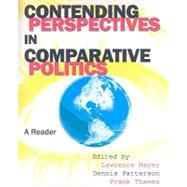
Note: Supplemental materials are not guaranteed with Rental or Used book purchases.
Purchase Benefits
What is included with this book?
| Preface | p. ix |
| Methodology and Comparative Analysis | |
| Does the Comparative Method Contribute to Building a Body of Explanatory Theory about Political Outcomes? | p. 1 |
| The Epistemology of Social Science and the Comparative Method | p. 5 |
| Beyond the Comparative Method | p. 20 |
| What Is the Utility of Formal Theory in Comparative Analysis? | p. 25 |
| Methodological Pathologies | p. 27 |
| In Defense of the Rational Choice Approach | p. 40 |
| The Practice and Context of Democratic Politics | |
| Why Do Some Democracies Emphasize Representation While Others Emphasize Ruling? | p. 56 |
| The Westminster Model of Democracy | p. 58 |
| The Consensus Model of Democracy | p. 68 |
| Ideological Change or Ideological Decline? | p. 75 |
| The End of History? | p. 77 |
| Post-Materialism in an Environment of Insecurity | p. 92 |
| Value Change in Industrial Societies | p. 114 |
| Systems and Institutions | |
| Realignment or Dealignment? | p. 130 |
| New Forms of Democracy? Reform and Transformation of Democratic Institutions | p. 134 |
| The Extreme Right: Defining the Object and Assessing the Causes | p. 149 |
| Do Electoral Institutions Matter? | p. 162 |
| Why Study Electoral Systems? and General Features of Electoral Systems | p. 165 |
| Who Has the Right to Vote? | p. 176 |
| What Executive Style Is Most Favorable to Democracy? | p. 195 |
| The Perils of Presidentialism | p. 200 |
| What Makes Presidential Democracies Fragile? | p. 211 |
| Juan Linz, Presidentialism, and Democracy: A Critical Appraisal | p. 228 |
| The State and National Sovereignty | |
| What Is the Importance of the Nation-State in an Age of Globalization? | p. 242 |
| The Eclipse of the State? Reflections on Stateness in an Era of Globalization | p. 245 |
| Sense and Nonsense in the Globalization Debate | p. 261 |
| Should the Nation-State Be Replaced by Larger Political Units? | p. 270 |
| The Case Against "Europe" | p. 272 |
| The EU and Its "Constitution": Public Opinion, Political Elites, and Their International Context | p. 281 |
| Understanding the Dutch "No": The Euro, the East, and the Elite | p. 289 |
| Modernization | |
| Does Modernization Lead to Stable and Effective Democracy? | p. 296 |
| Rapid Growth as a Destabilizing Force | p. 299 |
| Toward a Non-Ethnocentric Theory of Development | p. 309 |
| Is Dependency Theory an Explanation or an Ideology? | p. 326 |
| Dependency and Imperialism: The Roots of Latin American Underdevelopment | p. 327 |
| Structuring the Concepts of Dependency Reversal | p. 344 |
| Violence and Revolution | |
| Which Approach, Macro or Micro, Best Explains Political Violence? | p. 362 |
| A Causal Model of Civil Strife: A Comparative Analysis Using New Indices | p. 366 |
| Social Revolutions and Mass Military Mobilization | p. 389 |
| The Clash of Civilizations? | p. 404 |
| Transitions to Democracy | |
| What Causes Transitions to Democracy? | p. 419 |
| Political Regime Change: Structure and Process-Driven Explanations | p. 422 |
| Transitions to Democracy: Toward a Dynamic Model | p. 433 |
| Can Democratic Transition Be Consolidated? | p. 447 |
| Illusions about Consolidation | p. 449 |
| Toward Consolidated Democracies | p. 463 |
| Are There Cultural Requisites for Democracy? | p. 477 |
| Review of Edward Friedman, Ed., The Politics of Democratization: Generalizing East Asian Experiences | p. 479 |
| A Revised Theory of Modernization | p. 485 |
| Index | p. 515 |
| Table of Contents provided by Ingram. All Rights Reserved. |
The New copy of this book will include any supplemental materials advertised. Please check the title of the book to determine if it should include any access cards, study guides, lab manuals, CDs, etc.
The Used, Rental and eBook copies of this book are not guaranteed to include any supplemental materials. Typically, only the book itself is included. This is true even if the title states it includes any access cards, study guides, lab manuals, CDs, etc.